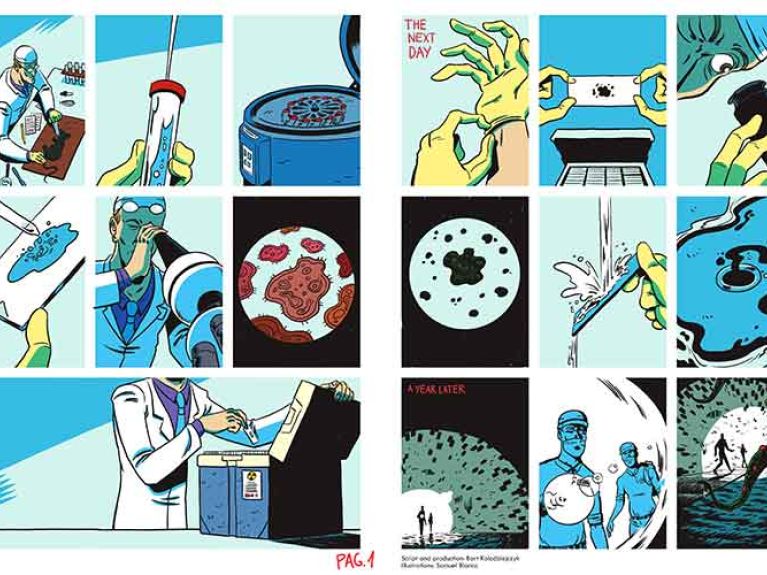Synthetic biology, Australia
Synthetic biology and its effects on human health, environment and biodiversity

Project name: Synthetic biology and its effects on human health, environment and biodiversity
Project location: Melbourne, Australia and worldwide
Website: http://www.g20-insights.org/policy_briefs/unified-g20-synthetic-biology-policie…
Twitter: https://twitter.com/bartkolodziejc
Dieses YouTube-Video kann in einem neuen Tab abgespielt werden
YouTube öffnenInhalte Dritter
Wir verwenden YouTube, um Inhalte einzubetten, die möglicherweise Daten über deine Aktivitäten erfassen. Bitte überprüfe die Details und akzeptiere den Dienst, um diesen Inhalt anzuzeigen.
Einverständniserklärung öffnenProject description:
Emerging technologies bring new and previously non-existing opportunities. With numerous opportunities come new challenges. Synthetic biology has the potential to drive significant advances in various industry sectors, including electronics, energy, biomedicine, food and agriculture. Synthetic biology can potentially address many of the SDGs, but there are myriads of scientific, social, commercial and legal issues, which policymakers must address. My project focuses on a number of outreach activities; including hands-on workshops and seminars, policy papers, and comic stories on a real synthetic biology issues and challenges. The project aims to build understanding and raise awareness of the new and rapidly emerging field of synthetic biology and to urge policymakers to regulate it before it is too late.
Goal and purpose of the project:
Due to the relative immaturity of the field, many synthetic biology products are still in the early stages of development. Despite this, scientists hope to use synthetic biology approaches to develop many useful types of goods. Synthetic biology market is expected to grow to $11.8 billion in 2018 with a compound annual growth rate (CAGR) of 34.4% over the five-year period from 2013 to 2018. Surprisingly, there is very little being done to assure safe manufacturing, use, and disposal of the products based on synthetic biology. My aims it to communicate and educate the public on opportunities and challenges in this emerging field. To build understanding and synthetic biology literacy and to prepare the public for the incoming synthetic biology revolution, that can potentially influence every aspect of our lives. Finally, to introduce policy solutions to regulate the field and to apply the precautionary principle to every new synthetic biology development. The precautionary principle states that if an action or policy has a suspected risk of causing harm to the public, or to the environment, in the absence of scientific consensus, the burden of proof that it is not harmful falls on the developers.
I have visited over 30 high schools in Victoria in 2016/2017 to perform hands-on outreach activities to high school students and introduce these emerging issues to them. I am currently working on a series of comic book stories and YouTube videos on issues related to synthetic biology.
I am now also mentoring tow young environmentalists in their climate change and biodiversity endeavors. They are rising stars and one day they will be real environmental leaders.
Motivation of the applicant / applicant team:
For the last five years, I have been actively advocating for the safe use and disposal of nanotechnology and synthetic biology products. Being previously an academic researcher in both of those fields, I am aware of many opportunities and possible threats of these technologies to human health and well-being, environment and biodiversity. There is a vast amount of funding for developments in synthetic biology, however very little is done to ensure safe procedures for manufacturing, handling, and disposal of these new type of products.
Together with the new and growing movement of homegrown Do-It-Yourself (DIY) synthetic biologists and so-called biohackers, the threats become real. Unlike the phenomenon seen in the early 90s with the advent of computers and computer hackers, biohackers pose a real, often irreversible large-scale changes to living organisms. Do-it-yourself synthetic biology protocols are widely available online together with synthetic biology kits that can be purchased via the internet. The above pose serious biosecurity and biosafety threats. With the growing terrorism worldwide, we have to ask ourselves do we want to make potential bioweapons available to anyone via the internet.
Transgenic species pose a serious problem to the environment and biodiversity, which are already on the edge of collapse due to the climate change, industrialization and population growth.
This complex and multidisciplinary field requires consolidated policy, communication and education approaches and my motivation are to apply sustainability approaches and precautionary principle to ensure the growth of synthetic biology while keeping it safe to use.
The host of this year's G20 Summit - Germany is a leader in regulating the fields of synthetic biology. German Genetic Engineering Act (Gentechnikgesetz - GenTG) is the first document of its kind and should provide the example to other G20 states and beyond.
Use of prize money:
If I win this award, I will use the prize to develop more comic book and videos on synthetic biology. The fraction of the money will go towards a paper comic book publication that will be distributed to Australian and overseas high schools. The rest of the money I am going to use for purchasing of additional laboratory equipment used in my mobile lab during high school visits/outreach activities. Biotechnology and synthetic biology equipment tend to be expensive, and with your financial support, I would be able to develop new and different hands-on experiments.
In case there is any remaining money, I would like to use it hire a cameraman and record my workshops to reach a broader audience via internet.
